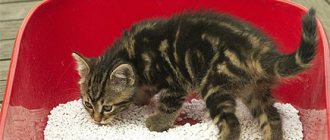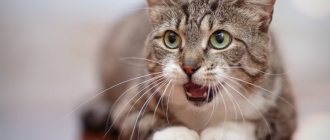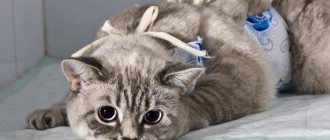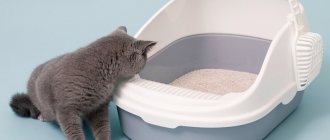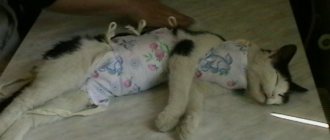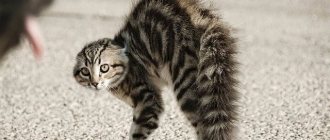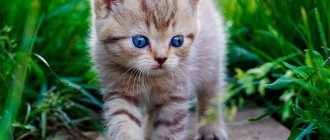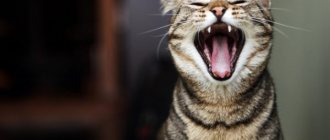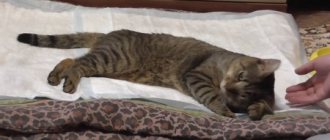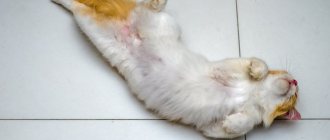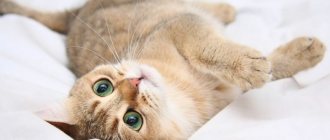Cats have a reputation for being very clean animals, perhaps one of the reasons is that they wash themselves very often. Kittens learn this from childhood, because mother cats constantly lick them, but they do this not only because of the love of cleanliness, but also by providing the massage necessary for digestion, stimulating proper breathing. It has been noticed that those kittens whose mothers did not care for them very well in childhood do not like to wash themselves too often in adulthood (in the photo the cat washes herself, managing to do it while lying down).
Kittens begin to independently monitor their own hygiene at the age of 2 months. They do this with the help of a rough tongue and teeth, which they use to comb out dirt from the fur, and the tongue acts as a comb.
Why do cats wash themselves all the time? There are several explanations for this. In addition to the obvious reason - maintaining cleanliness, by washing the cat also stimulates the glands that secrete a special secretion, which subsequently protects the fur from moisture. In addition, when brushing its fur, a cat can regulate its body temperature by laying it down differently and thereby changing the volume of air between the environment and the body. If a cat purrs and washes itself, this is its way of expressing its social activity, because washing itself is also a form of communication. It happens that cats living together lick each other like mothers lick their kittens, this is how they express love and affection.
In addition, sometimes the cat washes itself to calm down and relax, to make a decision if it is upset or confused. Methodically brushing his coat helps him avoid stress. There is even a theory that when cats are stressed, their temperature rises, and they begin to wash themselves to reduce it. That's why cats wash themselves - not just for cleaning or to invite guests, as many people think, but with a number of their own characteristics.
Why do cats stop licking their fur?
Refusal to lick always indicates the presence of certain problems with the health or mental state of the cat. The animal looks unkempt and unkempt. Let's look at why pets may stop washing themselves.
Diseases of the gums and mouth
Gingivitis or the initial stage of periodontal disease often lead to the cat refusing to lick. Inflamed, ulcerated gums in the area of the teeth cause severe pain when washing, which leads to a gradual abandonment of this habit.
For your information. Diseases of the gums and mouth are usually accompanied by a putrid odor from the mouth.
Arthritis
Any movement of the paws with arthritis causes joint pain. The animal tries to avoid painful sensations and, accordingly, tries to lick its fur coat as little as possible.
Obesity
Obesity is the scourge of castrated and sterilized animals. Improper nutrition leads to a sharp increase in body weight, and increased body weight makes domestic cats lazy and sluggish. Victims of excess weight wash themselves much less often than their lean counterparts.
Be sure to read:
Why cats leave home: the main reasons, what to do, how many days they can walk
Stress
Stress can also affect the frequency and quality of washing. Animals in stressful situations refuse to drink and eat, do not go to the toilet and stop licking themselves.
Infectious diseases
Serious health problems are usually accompanied by refusal to eat and drink, lethargy and apathy. Sick cats stop washing themselves and their fur becomes dirty and greasy.
If cleanliness is one of the virtues, then cats should live in heaven, in a place specially designated for them. Felines' dedication to neatness gives them a reputation as clean, refined animals. In fact, an adult cat spends 30 to 50 percent of her waking hours demonstrating some type of washing behavior. From the moment of birth, a cat learns self-care techniques. By licking the cubs, the mother cat stimulates the kittens' breathing and their sucking instincts. Licking helps guide blind babies directly to the nipples.
When a mother cares for her kittens, she not only washes them, but also establishes a bond with them. Licking also helps kittens' digestive and excretory systems; The little animals can defecate only when their mother's rough tongue stimulates their tummies.
Two-week-old kittens begin to lick themselves, hygiene and “social” instincts oblige them to do this. Most kittens know how to wash themselves before they leave their mother. But those who were poorly cared for as children become unkempt adults.
Cats clean most of their bodies using their tongue and teeth. The central part of the murka's tongue contains many tiny, backward-facing tubercles. These rough spots make the cat's tongue a perfect cleanser.
After eating, your pet may spend a lot of time licking her mouth, mustache, and chin clean; however, washing is not only about a clean face. During the "sanitary hour" the cat licks and cleans the shoulders, front paws, then the sides, genital area, hind legs and tail from base to tip. Each pussy has its own washing ritual: your own may start its toilet from the shoulders, while another will lick the tail first.
If a cat finds a piece of dirt or something foreign on itself while licking, it gets rid of it with the help of its teeth. She uses her teeth to bite the dirt between her toes and clean it off her paw pads.
But licking and biting alone cannot reach all parts of the body, so for personal hygiene the cat uses either wet front or hind paws. She prefers to “handle” herself with her front paws until they remain slightly wet; First, she passes this “washcloth” over the face and head, from the ears and eyes to the cheeks and chin. After several rubbings, she licks her paws again; Having finished with the head and neck, he proceeds to more distant parts of the body. Having cleaned one half, he changes his paw and repeats the same procedure on the other side of the head.
The same places that cannot be washed with the tongue or front paws are scraped by the cat with the hind paws.
Why do cats wash themselves? You may have noticed that your cat washes itself constantly, while your neighbor's pet only starts washing itself once it gets dirty enough. Or maybe it caught your eye that your pet begins to wash itself after being frightened by a loud noise or having received a scolding for some offense? Humans and cats wash themselves for different reasons; Regular cleaning routines are important for all cats.
1. By pinching its fur, the cat stimulates the glands located on the skin at the base of each hair. These glands produce sebum, a kind of oily secretion that lubricates and protects the fur from moisture. After stimulating these glands during the washing process, the cat spreads sebum throughout the fur with its tongue.
Another significance of this secretion is that it contains cholesterol, which in the sun turns into vitamin D, which helps strengthen bones and teeth, and also helps the cat’s body accumulate calcium and phosphorus. Thus, by washing, Murka provides the necessary elements for the formation of such an important vitamin.
2. Washing the cat in itself is of great importance. During this procedure, the cat removes fallen, dead hair from its fur. Most pussies lose a lot of hair in the spring or during illness; In addition, dry, warm indoor air leads to hair loss in pets all year round. To prevent matting of cats' fur, dead hair must be removed.
But, in addition to inconvenience, often painful, matted fur can become a favorable environment for the development of parasites. Regular washing fluffs up the coat and thus reduces the risk of parasites - ticks, fleas and other insects.
3. Washing helps your cat control its body temperature. Wool plays the role of a protective layer between the body and the environment, and therefore clean and healthy fur better maintains normal temperature.
When a cat washes itself, it places tufts of hair in different directions. And depending on how the hair is styled, she can regulate her own temperature. A cat that washes itself thoroughly usually has smooth, fluffy fur, and it lies in separate layers. When cold weather sets in, the cat uses saliva to smooth out the fur, making it a more effective insulator and helping the body retain heat.
But your pet also washes itself to cool down. Most mammals begin to sweat when they overheat to lower their body temperature. Cats also have sweat glands, but because their body is covered with hair, sweat is only produced on the pads of their paws, which brings relief to the body. This is not enough to completely get rid of excess heat.
The cat smoothes its fur so that the fur allows air to penetrate between the hairs, which cools the skin. Animals may breathe rapidly to keep their bodies cool, but a third of the heat is lost through their skin and fur.
But washing also has social and emotional functions. If washing itself has great health benefits, then the cat's behavior in this case can be regarded as a form of “social interaction”. Kittens begin to lick and wash each other and their mother from the age of three weeks. Mutual washes typically peak between five weeks and four months. Then, as experts testify, this habit fades away.
As they grow older, mutual washing most often occurs between relatives from the same family. However, when several unrelated cats gather and mutual consent is established between them, they can also lick, wash each other and play with each other. An example of this would be a gathering that researchers call a nightclub. This term refers to animal games on neutral, and not on the personal territory of a cat. It is not the warmth of the females that attracts them here; they do not fight among themselves. The animals simply lick each other and greet each other with purrs, and then return to their homes.
During the mutual washing procedure, cats usually lick each other's most inaccessible places - the head and neck. This activity is fun and provides an opportunity to interact with other animals. One could even say that mutual washing is a unique form of communication, an expression of love and friendship. By licking you and accepting your caresses, the pussy tries to involve you in this process, which satisfies not only physical and “social” needs, but also enriches it with positive emotions. The cat loves to be stroked, and by licking itself, it thereby gives a massage.
When you stroke or caress a cat, its nervous system also reacts to this. The heartbeat slows down, and as the body relaxes, muscle tension subsides. At the same time, more gastric juice and saliva are produced, and digestion improves. When a cat is scared or no one pets it, there is a deterioration in the functioning of the digestive organs.
Very often, a cat washes itself when it is confused or frightened by something. Some animal behaviorists believe that washing a cat helps itself overcome conflicts, and massage calms it down. You've probably noticed how a cat, faced with stress, initially reacts violently to it, and then suddenly calms down and begins to wash itself.
Have you ever seen your pet in a difficult situation? For example, how does she roll off the couch and fall on the floor? What does she do immediately after this? Most likely, after looking around the room and seeing no one to watch her, your cat will begin to lick herself. Some cat experts claim that fear or confusion causes an increase in body temperature in these animals and, by washing themselves, they thereby get rid of excess heat.
H. Nepomnyashchiy “Keeping a Cat”
Animal communication and stress relief
Now you know the main reasons why cats wash themselves often. But animals often lick each other. What is this connected with? Typically, pets express their friendliness towards other animals in this way. This is their form of communication. If there are several cats living in a house and they like to lick each other, then this indicates their friendly relationship.
Washing evokes positive emotions in animals. This helps them relieve stress. You may notice that cats often lick themselves when separated from their owner. Intense washing may be noticed when a pet changes homes or when the pet is scared or angry.
Hunting instinct
Cats are believed to be very clean.
But this is only one of the reasons for frequent licking. During walks, animals can tinker in the sand or soil for a long time, and they are not bothered by dirty fur. However, cats wash themselves frequently at home. Why is this happening? One of the main reasons for licking is the desire to get rid of foreign odors. Sometimes you can notice how cats begin to wash themselves after stroking or playing with the owner. This habit was left to them from the ancestors of domestic cats. Wild representatives of the cat family eliminated odors in this way in order to be invisible during the hunt. In addition, pets have a very sensitive sense of smell. They do not like other people's smells and recognize only their own.
Sign if a cat washes itself
Everyone knows the sign: if the cat starts washing itself, expect guests. But this is only a basic belief; many peoples also have more extensive explanations for every cat action associated with washing and licking, for example:
- licks the tail, the entire skin - to bad weather, snowstorm or rain;
- licks its paws (as in the photo), washes its head with its paw - for good weather (but if it scratches behind the ear at the same time - for rain or snow);
- if you wash your ears thoroughly, it will rain (this sign came to us from Ancient Rome);
- the cat washes itself with its paws, turning in the direction from which the wind will blow (Serbian sign).
Signs regarding guests:
- if a cat washes itself at the door, wait for the priest to come;
- a cat washes its right ear - an unfamiliar man will come;
- if left - an unfamiliar woman;
- a sign of Japanese traders - if a cat runs its left paw over its ear, then buyers will definitely come;
- if the cat’s hind paws are hot when washing, then welcome guests will come;
- if they are cold, then guests will be unwanted.
